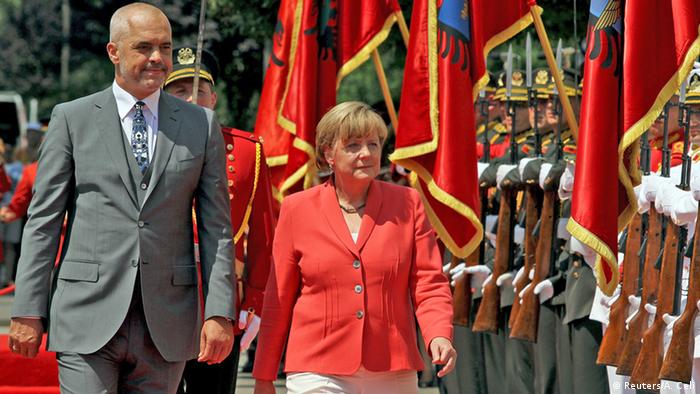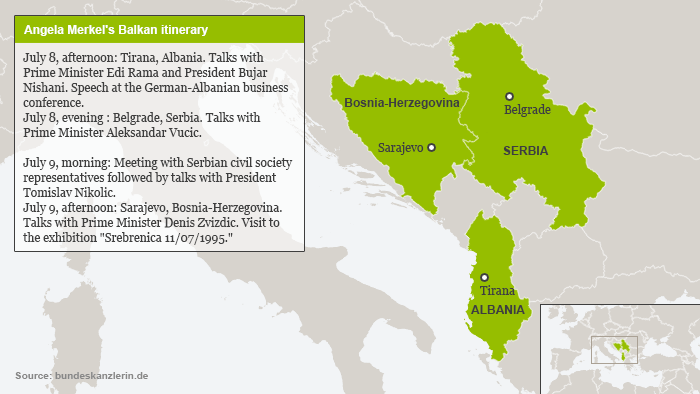German Chancellor Angela Markel has arrived in Albania on a two-day
visit, which includes Serbia and Bosnia-Herzegovina. The countries'
desire to join the European Union has been complicated by the ongoing
Greek crisis.
Angela Merkel was to hold meeting with Albanian President Bujar Nishani later on Wednesday and
was also scheduled to address a conference of German and Albanian businessmen.
Earlier in the day, Merkel met with Albanian Prime Minister Edi Rama in the capital Tirana, confirmed Steffen Seibert, the German chancellor's spokesman, via Twitter.
Merkel is the second German chancellor since 1999 to have visited Albania, one of the poorest countries in Europe.
Albania, Serbia and Bosnia-Herzegovina have long been campaigning to join the European Union, but the three countries' mutual rivalries have complicated matters, as has the current crisis in Greece. In the wake of the debt dispute with Athens, EU officials are expected to lay out tougher conditions to accept countries with troubled economies.
The Greek debt crisis has also affected the economies of the poor states in the Balkans, which are economically dependent on Athens. The potential impact of the crisis is likely to be on Merkel's agenda during her meetings with the leaders of the three nations. Trade, energy and bilateral and EU relations will also be discussed.
In her weekly video address on Saturday, Merkel, however, said the Balkans states had a good chance of joining the EU.
"In all the difficulties that we currently have, there has been progress," she said, adding that the prospects for EU membership would also help these countries resolve their inter-regional disputes.
Merkel is expected to arrive in the Serbian capital Belgrade on Wednesday evening where the Serbian president, Aleksandr Vucic, is to receive her, the statement from Berlin said. She would also talk to civil society representatives at a breakfast meeting on Thursday.
Sarajevo in Bosnia-Herzegovina would be Merkel's last stop in the Balkans visit, where she will hold crucial talks with President Denis Zvizdic and visit an exhibition on the Srebrenica massacre of 1995.
shs/kms (AP, dpa, Reuters)
Earlier in the day, Merkel met with Albanian Prime Minister Edi Rama in the capital Tirana, confirmed Steffen Seibert, the German chancellor's spokesman, via Twitter.
Albania, Serbia and Bosnia-Herzegovina have long been campaigning to join the European Union, but the three countries' mutual rivalries have complicated matters, as has the current crisis in Greece. In the wake of the debt dispute with Athens, EU officials are expected to lay out tougher conditions to accept countries with troubled economies.
The Greek debt crisis has also affected the economies of the poor states in the Balkans, which are economically dependent on Athens. The potential impact of the crisis is likely to be on Merkel's agenda during her meetings with the leaders of the three nations. Trade, energy and bilateral and EU relations will also be discussed.
In her weekly video address on Saturday, Merkel, however, said the Balkans states had a good chance of joining the EU.
"In all the difficulties that we currently have, there has been progress," she said, adding that the prospects for EU membership would also help these countries resolve their inter-regional disputes.
Merkel is expected to arrive in the Serbian capital Belgrade on Wednesday evening where the Serbian president, Aleksandr Vucic, is to receive her, the statement from Berlin said. She would also talk to civil society representatives at a breakfast meeting on Thursday.
Sarajevo in Bosnia-Herzegovina would be Merkel's last stop in the Balkans visit, where she will hold crucial talks with President Denis Zvizdic and visit an exhibition on the Srebrenica massacre of 1995.
shs/kms (AP, dpa, Reuters)
DW recommends

German Chancellor Angela Merkel has assured Albania
and Western Balkan countries there is no artificial delay in their EU
entry prospects but says they should deepen reforms to achieve the
required standards.
Merkel on Wednesday started a two-day tour of Albania, Serbia and Bosnia focusing on their EU integration progress as well as economic and energy issues.
Albania, which was granted candidate status last year, must fulfill five
categories regarding its public administration and justice system ahead
of launching full membership talks.
Earlier this week the German government, one of the biggest donors to
post-communist Albania, gave 107.5 million euros ($119.3 million) to
promote the country's energy and water supply sectors.
The chancellor continues her trip to the Serbian capital, Belgrade, later Wednesday and to Sarajevo, Bosnia, Thursday.


No comments:
Post a Comment